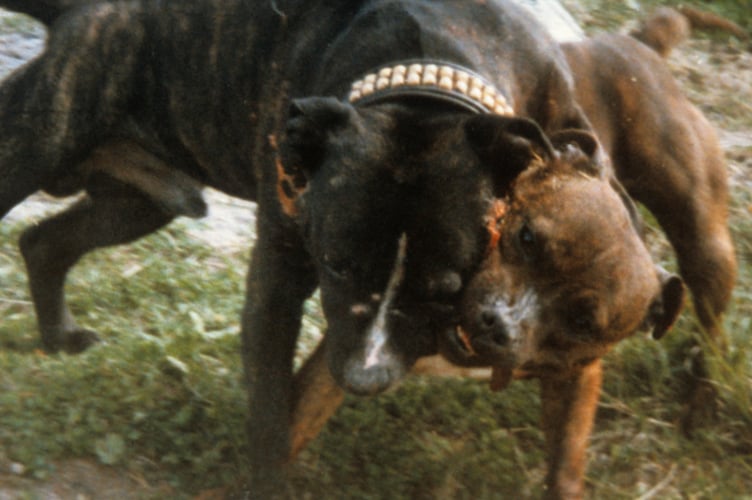THE RSPCA is calling on people in Wales to its eyes and ears following a rise in dog fighting.
There have been 55 cases in Wales of dog fighting since 2019, with two cases in Ceredigion and three in Powys last year alone.
The figures reveal that Carmarthenshire recorded two incidents of dog fighting in 2021 and one last year, with one incident recorded in Gwynedd in 2020.
The leading animal welfare charity released the new figures as part of their Cancel Out Our Cruelty Campaign which launched at the start of the month.
RSPCA dog fighting expert and Special Operations Unit (SOU) chief inspector for Wales, Ian Muttitt, said: “Sadly we are back seeing pre-pandemic levels of dog fighting incidents.

“Across England and Wales we were seeing an average of 19 incidents investigated every month in 2019 and that has risen to a shocking 31 a month so far this year. While last year in Wales there was a notable increase in dog fighting incidents.
“It’s staggering that something which has been illegal for almost 200 years which most people would consider consigned to history is still so rife.”
The RSPCA recently launched its Cancel Out Cruelty campaign, to raise funds to help its frontline rescue teams continue to save animals from cruelty and abuse and to raise awareness about how to stop cruelty to animals for good.
“Each year, these reports of cruelty reach its terrible annual peak in the summer months.” Ian continued. “Around this time of year nationally we receive a report of an animal being beaten on average every hour of every day.
“We don’t know why reports of animal cruelty peak in the summer months although things like animal abuse being more visible as people are outdoors more and the cost of living crisis could be major factors.
“Dog fighting, which is connected to organised crime, is just one of the many acts of cruelty we see every year. The RSPCA is the only charity rescuing animals and investigating cruelty in England and Wales with a team of frontline rescue officers, specialist vet teams and a network of animal care centres and branches working tirelessly to save animals and provide rehabilitation to animal victims.
“Together, we believe we can and will cancel out cruelty to animals by replacing violence with kindness. We are urging people to donate to our Cancel Out Cruelty campaign, every donation will help animals.”

Dog fighting was outlawed in England and Wales in 1835 but still goes on today. The RSPCA - founded nearly 200 years ago - is the country’s leading organisation tackling dog fighting and, for the last four decades, the RSPCA’s SOU have been investigating reports, rescuing dogs and bringing those responsible to justice.
Sadly, many of the dogs used by dog fighters are never found and those who are rescued are often identified as banned breeds under the Dangerous Dogs Act and cannot legally be rehomed.
In total the RSPCA’s SOU have investigated 1,156 incidents of dog fighting across England and Wales since 2019. London has been revealed as the worst hotspot for dog fighting with 91 incidents, Greater Manchester (82 investigations), West Yorkshire (69 investigations) and the West Midlands (59 incidents), and Lancashire (56) following closely behind.
Wales as a whole would appear next in this list with 55 incidents.
Ian added: “The dog fighting world is a dark and secretive place. It could be happening in an inner-city warehouse next door to your office or on a rural farm in your quiet village.
“Signs of dog fighting can vary but if you notice a dog with lots of scars on its face, front legs, hind legs and thighs, or with puncture wounds and mangled ears - this could be a sign of dog fighting and should be reported to the RSPCA or the police. Other suspicious activity includes dogs being hidden away in outbuildings or kennels of sight and not excercised in public.
“Dogs who win fights are prized but those who refuse to fight or lose are often abandoned or killed.
“Overall dog fighting in England and Wales has increased since 2019, jumping from a total number of 232 incidents investigated by the RSPCA in 2019 to 355 in 2022. We have dealt with 155 incidents this year, but we are only six months into the year, so we are concerned we will see this number steadily rise.”
The RSPCA are urging the public to be their eyes and ears and to report anything suspicious to them. Anyone who is concerned about the welfare of an animal or suspects dog fighting may be taking place should visit our website to find out how to report cruelty
The RSPCA are highlighting the issue as part of the charity’s Cancel Out Cruelty campaign.
Sadly the RSPCA receives around 91,500 calls to its cruelty line every month and investigates 5,300 reports of deliberate animal cruelty but in the summer calls rise to 133,000 a month - which is three every minute.
The RSPCA’s frontline teams are working hard to rescue animals in need this summer but we can't do it alone - we need your help to Cancel Out Cruelty. To help the RSPCA continue investigating dog fighting and other animal cruelty, please donate today.




Comments
This article has no comments yet. Be the first to leave a comment.